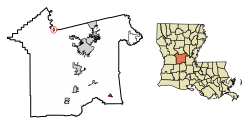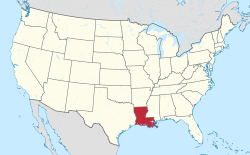Cheneyville, Louisiana
Cheneyville, Louisiana | |
|---|---|
Town | |
| Town of Cheneyville | |
 | |
 Location of Cheneyville in Rapides Parish, Louisiana. | |
 Location of Louisiana in the United States | |
| Coordinates: 31°00′48″N 92°17′22″W / 31.01333°N 92.28944°W | |
| Country | United States |
| State | Louisiana |
| Parish | Rapides |
| Government | |
| Area | |
| • Total | 1.02 sq mi (2.63 km2) |
| • Land | 1.02 sq mi (2.63 km2) |
| • Water | 0.00 sq mi (0.00 km2) |
| Elevation | 62 ft (19 m) |
| Population (2020) | |
| • Total | 468 |
| • Density | 460.63/sq mi (177.82/km2) |
| Time zone | UTC-6 (CST) |
| • Summer (DST) | UTC-5 (CDT) |
| Area code | 318 |
| FIPS code | 22-14660 |
| GNIS feature ID | 2406260[2] |
Cheneyville is a town in Rapides Parish, Louisiana, United States. It is part of the Alexandria, Louisiana Metropolitan Statistical Area. The population was 625 at the 2010 census.
History
[edit]The town was named for settler William Cheney.[3]
Cheneyville is significant in the history of the Restoration Movement associated with Alexander Campbell. In 1843 most of the membership of a Baptist congregation, under the leadership of William Prince Ford, who had been influenced by Campbell's writings, became a Church of Christ. The Cheneyville Christian Church is the oldest congregation associated with the Restoration Movement in Louisiana. In 1857, Campbell visited the congregation and was favorably impressed by its fellowship between the races.[4]
Ford is also known as the original enslaver of Solomon Northup, the main character in the feature film, Twelve Years a Slave. Northup was an African-American who had been born free, but kidnapped in Washington, D.C., and sold to Ford in New Orleans in 1841.
Notable people
[edit]- C. H. "Sammy" Downs lived in Cheneyville.[5]
- Wilbur Dyer, state representative from south Rapides Parish from 1974 to 1980[6]
- Sue Eakin, author and editor of Twelve Years a Slave.[7]
- Leroy Augustus Stafford, a Rapides Parish planter and brigadier general in the Confederate Army.[8]
Geography
[edit]According to the United States Census Bureau, Cheneyville has a total area of 1.0 square mile (2.6 km2), all land.
Demographics
[edit]| Census | Pop. | Note | %± |
|---|---|---|---|
| 1910 | 498 | — | |
| 1920 | 678 | 36.1% | |
| 1930 | 835 | 23.2% | |
| 1940 | 913 | 9.3% | |
| 1950 | 918 | 0.5% | |
| 1960 | 1,037 | 13.0% | |
| 1970 | 1,082 | 4.3% | |
| 1980 | 865 | −20.1% | |
| 1990 | 1,005 | 16.2% | |
| 2000 | 901 | −10.3% | |
| 2010 | 625 | −30.6% | |
| 2020 | 468 | −25.1% | |
| U.S. Decennial Census[9] | |||
2020 census
[edit]| Race | Number | Percentage |
|---|---|---|
| White (non-Hispanic) | 121 | 25.85% |
| Black or African American (non-Hispanic) | 320 | 68.38% |
| Other/Mixed | 22 | 4.7% |
| Hispanic or Latino | 5 | 1.07% |
As of the 2020 United States census, there were 468 people, 275 households, and 156 families residing in the town.
2000 census
[edit]As of the census[11] of 2000, there were 901 people, 267 households, and 183 families residing in the town. The population density was 863.9 inhabitants per square mile (333.6/km2). There were 314 housing units at an average density of 301.1 per square mile (116.3/km2). The racial makeup of the town was 33.07% White, 65.70% African American, 0.33% Native American, 0.55% from other races, and 0.33% from two or more races. Hispanic or Latino of any race were 2.33% of the population.
There were 267 households, out of which 28.5% had children under the age of 18 living with them, 39.7% were married couples living together, 26.2% had a female householder with no husband present, and 31.1% were non-families. 28.5% of all households were made up of individuals, and 14.6% had someone living alone who was 65 years of age or older. The average household size was 2.71 and the average family size was 3.39.
In the town, the population was spread out, with 24.0% under the age of 18, 10.2% from 18 to 24, 30.4% from 25 to 44, 22.6% from 45 to 64, and 12.8% who were 65 years of age or older. The median age was 36 years. For every 100 females, there were 103.8 males. For every 100 females age 18 and over, there were 102.1 males.
The median income for a household in the town was $19,044, and the median income for a family was $21,917. Males had a median income of $21,250 versus $12,159 for females. The per capita income for the town was $10,244. About 29.4% of families and 43.9% of the population were below the poverty line, including 46.2% of those under age 18 and 27.0% of those age 65 or over.
See also
[edit]References
[edit]- ^ "2020 U.S. Gazetteer Files". United States Census Bureau. Retrieved March 20, 2022.
- ^ a b U.S. Geological Survey Geographic Names Information System: Cheneyville, Louisiana
- ^ "Profile for Cheneyville, Louisiana". ePodunk. Retrieved June 14, 2010.
- ^ Tryggestad, Erik (February 27, 2014). "Oscar contender '12 Years a Slave' has ties to Restoration Movement". Christian Chronicle. Retrieved February 28, 2014.
- ^ "Rick, Markway, "The Prosecutor: District Attorney James Crawford 'Jam' Downs"" (PDF). lwaa.org. Archived from the original (PDF) on February 22, 2014. Retrieved June 27, 2013.
- ^ "Membership in the Louisiana House of Representatives, 1812-2016: Rapides Parish" (PDF). house.Louisiana.gov. Archived from the original (PDF) on October 6, 2014. Retrieved December 22, 2014.
- ^ "Obituary of Sue Lyles Eakin". melanconfunerals.com. Retrieved September 21, 2009.
- ^ "David Theophilus Stafford and Leroy Augustus Stafford". Louisiana Historical Association. Archived from the original on July 16, 2016. Retrieved August 25, 2014.
- ^ "Census of Population and Housing". Census.gov. Retrieved June 4, 2015.
- ^ "Explore Census Data". data.census.gov. Retrieved December 29, 2021.
- ^ "U.S. Census website". United States Census Bureau. Retrieved January 31, 2008.

